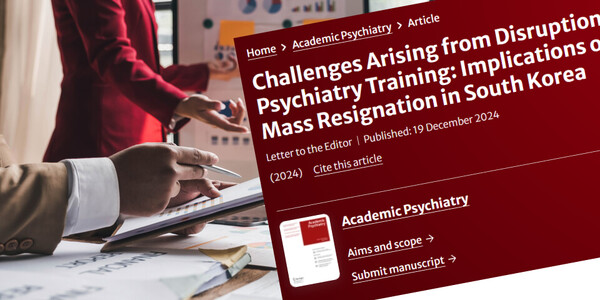A resigned medical resident's perspective on how the government's healthcare policies have destroyed the training environment for psychiatrists, focusing on the relationship between trainee doctors, patients, and professors, has been featured in an international journal.
Yoon June-sung, a resigned trainee doctor of the Department of Psychiatry at Asan Medical Center in Seoul, recently published an article, “Challenges Arising from Disruptions in Psychiatry Training: Implications of Residents' Mass Resignations in South Korea,” in the international journal Academic Psychiatry.”

In the article, Yoon examined the impact and solutions to the crisis in the field of psychiatry, saying, “The government's healthcare reform aimed at essential care has paradoxically reduced the supply of psychiatrists, who are essential for mental health care and suicide prevention.”
Korea has the highest suicide rate of any country in the Organization for Economic Cooperation and Development (OECD). The number of people in need of mental health services has also increased by 42.2 percent from 2015 to 2021.
However, due to the mass resignation of doctors who resisted government healthcare policies, the number of new psychiatrists in 2025 was 67 percent lower than the previous year, with only 40 starting their practice. As of October, only 21 percent of psychiatrists were working in training hospitals, according to the article.
Yoon said that the mass resignation of doctors stemming from government policies has damaged the relationships between patients and doctors and between doctors and supervisors (professors).
The resignations abruptly interrupted long-term psychotherapy, which can be traumatizing for patients who have already experienced loss and rejection (being cut off from their therapist again) and severely damaged their self-perception of being loved and cared for, he said.
“For the practitioner, this leads to guilt for not completing treatment properly and a loss of ‘working-through’ opportunities,” Yoon said. “Working through is helping patients change gradually and is central to long-term psychotherapy.”
Yoon worries that the stable trusting relationship between patient and therapist required for working through has been compromised. Even if therapists resume practicing in the future, it will not be easy for them to experience it again.
In addition, medical residents lost mentors who would guide their growth as good clinicians, he said.
“Of the preceptors who responded to the resigning residents' requests for support, only a few joined them in resigning. Yoon wrote that trainee doctors felt abandoned by their mentors and that their internal representation of the supervising physicians changed,” Yoon said. “The breakdown of social bonds in psychiatry training will seriously impact the quality of life of the medical residents and the training environment.”
At the same time, he emphasized the role of supervisors in “restoring the broken training environment.”
“Supervising physicians should not only conduct research and practice but also play a role in defending the current medical education and training environment against government threats,” Yoon said. “Only their active efforts can restore broken trust, bring back psychiatrists, and restore the broken training system.”

